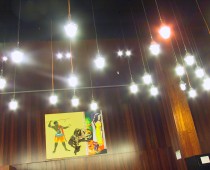At a fancy dinner last night with a bunch of artists and philosophers and
business people, the topic of books came up.
A guy who worked for Time once recalled a near-proverb that everybody reads
magazine articles but nobody remembers them, while nobody reads books but
everybody remembers them.
Be a little more demanding though: do you remember anything?
No the New Yorker articles are not at your fingertips, however gripping
they were at the time. When I realized this was happening to me I canceled
my subscription. Why read for hours when it all disappears?
The TED talks are gone. And their amazingly simple ways for you to be a
better person.
The book on 1919 or Lincoln or Moby Dick chapter 37 or Borges? I would
wager you dont remember. Just pick up the old copy you had and see all
those amazing passages you marked and dont remember any more. That will
convince you.
Personal stuff too. Childhood birthday parties. Friends from school. The
first time you drove.
Even what you do remember is created by the stories you have told and heard
about it, and the photos.
Maybe you agree with me or maybe you dont quite. Perhaps you remember
everything in all its richness.
Me, I have a lot of memories but they feel like “episodes”, the stories
neuroscientists say form our experience and later memory.
But here is an idea: all those emails, pictures, statuses, posts, ebooks,
checkins, map stars, phone calls, tickets, receipts and all those
movements, steps, runs, rides, bites, sleeps, and everything else…all of
it is digital and saved somewhere.
Gordon Bell spent a year cataloging everything in 2007 or so, as I learned
this week at DLD.
By now I think I am automatically recording more than he was.
What I cannot yet do is see the memories this creates.
Browsing through photos, flipping through old books, visiting a place you
once knew or a person you haven’t seen. That’s analog.
Seems to me it’s high time we bring together our digital lives and find our
memories.

3 Comments